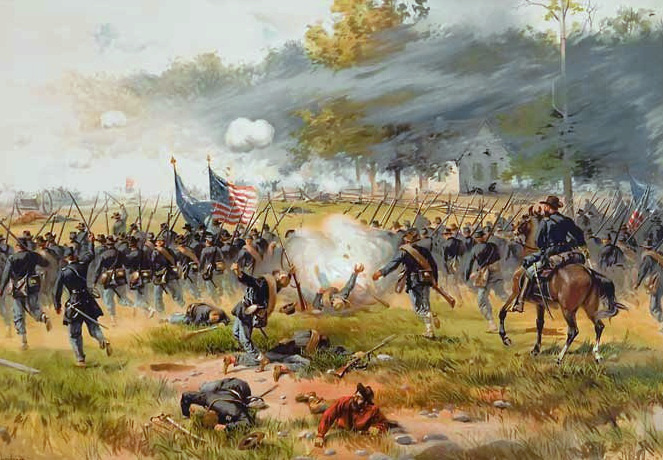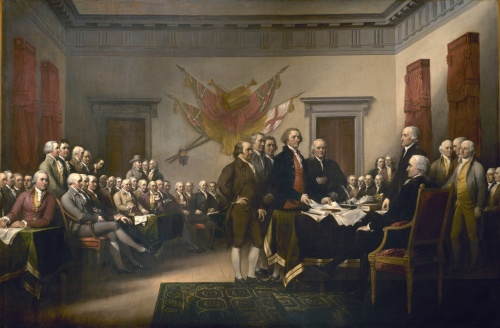
Every 4th of July, you’re likely to be wished “Happy Secession Day” by at least one proud Southerner.
However, the Confederacy was in direct violation of the Declaration of Independence. You can’t claim your right to self-government under the Declaration for the specific purpose of depriving a whole class of people of their Declaration rights to life, liberty and the pursuit of happiness.
But that’s exactly what the South did. And if a grits-loving slow-talking Southerner says it, you should listen. 🙂
Why the South Actually Seceded
I’m going to settle this argument once and for all. (Ha!)
Not many people realize this, but the eleven states that seceded from the Union actually explained why they were seceding in their Secession documents.
“We hold these truths to be self-evident…”
Just like the Declaration of Independence, South Carolina’s “Declaration of the Immediate Causes” lays out first their moral right to secede. There were three elements of their case:
- The right of a state to govern itself (citing the Declaration of Independence)
- The right to abolish government when it becomes destructive of the ends it was established for (again citing the Declaration)
- The law of contract (when two parties contract and one breaks the terms, the other is released from the contract)
It’s very significant that the South Carolina leaders based their right to secede on the principles of the Declaration of Independence.
“Let facts be submitted to a candid world…”
Now things get interesting.
As you read, you don’t see anything about tariffs or the economy or anything else. What you do see is a number of complaints against the non-slaveholding states:
“[The non-slaveholding States] have assumed the right of deciding upon the propriety of our domestic institutions….they have denounced as sinful the institution of slavery; they have permitted open establishment among them of societies, whose avowed object is to disturb the peace and to eloign the property of the citizens of other States. They have encouraged and assisted thousands of our slaves to leave their homes; and those who remain, have been incited…to servile insurrection.” (emphasis added)
Oh dear! And to top it all off:
“A geographical line has been drawn across the Union, and all the States north of that line have united in the election of a man to the high office of President of the United States, whose opinions and purposes are hostile to slavery…he has declared that that ‘Government cannot endure permanently half slave, half free,’ and that the public mind must rest in the belief that slavery is in the course of ultimate extinction.”
Perish the thought! This means the end of our civilization (not to mention our cotton crops and our lavish banquets and our frilly dresses). We must act!
And act they did, passing the first Ordinance of Secession and firing the first shots of the Civil War.
Either Freedom Matters or it Doesn’t

This document starts off by basing the morality of their actions on the principles of the Declaration of Independence. But what were those actions? Efforts to preserve their practice of violating other principles in the very same Declaration.
Was secession Constitutional? What does it matter? The Declaration was the heart of our heritage; the Constitution was the “how.” Things got really complicated, of course. But at the end of the day, either freedom matters or it doesn’t. You can’t fight for your freedom to deny other people of theirs.
When you do, you get thrashed by blue-coated Yankees. As Barney Fife would say, “Let that be a lesson to you!”
Everything you wrote is absurd. The Declaration of Independence is a secession document, and its author owned over 600 slaves during the course of his life. Indeed, one of the specific complaints slave-owner Jefferson made against the King was that he was interfering with the colonists right to own slaves. So if the ownership of slaves somehow undermined the right to political freedom for the Confederates, then it surely undermined it for the slave-owning, slave-trafficking colonists. If you holier-than-thou mantra of “either freedom matters or it doesn’t”, is applicable to the Confederates, then it is applicable to the colonists. And dearie, it matters a great deal that secession was perfectly lawful in 1860.
“However, the Confederacy was in direct violation of the Declaration of Independence. You can’t claim your right to self-government under the Declaration for the specific purpose of depriving a whole class of people of their Declaration rights to life, liberty and the pursuit of happiness.”
I see. So, according to your logic, it is perfectly legitiamate to claim the right of self-government while slavery and slave-trafficking are already an established fact of everyday life, as it was in the colonies, but if you wish to claim self-government and continue the practice of slavery, then you are not allowed to claim the right to self-government.
What’s up with that?
Young lady,
I would like to humbly point out that even if you made a perfect argument and everything you said was logical, valid, and correct, the whole tone in which this argument is put down is highly condescending and arrogant, and therefore it invites harsh critique and stern disagreement. In whatever you write or speak I would urge you to guard against taking the position of “high superior.” Many brilliant minds have added their intellectual weight to the issues surrounding the civil war and many have taken a strong stance in opposition to your assertions.
So in conclusion, please be careful to always speak your mind in respectful love. Your arguments will almost always be taken more seriously when you do.